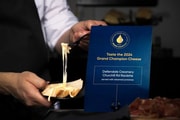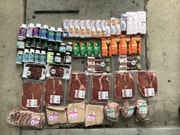Bank scam exposed: Five charged for alleged plot involving ATM skimmers and counterfeit bank cards
It's a brave new digital world out there, but as our tech-savvy members would know, some unwanted risks come with all the otherwise great perks of the internet. One of the most troubling on the list is the threat of cybercrime.
Recently, in a joint effort by Australian and US authorities, five foreign nationals were apprehended for an alleged high-tech bank fraud involving ATM skimmers and fake bank cards.
Australian Federal Police Detective Superintendent Tim Stainton, reacting to the arrest, highlighted how pervasive cybercrime has become.
'Australia remains a lucrative target for cybercriminals, and in this digital age, we know that personal data has become incredibly valuable to criminals,' he stated.
‘We're well advanced in terms of their activities and are monitoring them on an ongoing basis.’
These five individuals were allegedly part of the same international crime ring earlier investigated by the United States Secret Service (USSS).
The syndicate had reportedly identified Australia as an opportune target.
Earlier this year, the USSS arrested five Romanian nationals allegedly targeting US citizens receiving welfare benefits via electronic benefits transfer cards.
According to authorities, the alleged offenders installed ATM skimmers to clone victims' electronic benefits transfer card details and PINs. At the start of each month, the crime syndicate re-encoded the cloned bank cards to visit ATMs and withdraw the newly loaded funds.
Acting on information from their US counterparts, the Australian Federal Police (AFP) traced suspicious packages believed to contain ATM skimmers sent from China, Britain and the US to these offenders.
The AFP and New South Wales Police also raided a short-term rental property in Rhodes, Sydney, where they seized $12,935 in cash, skimming devices, false identity documents, including passports, bank cards in other people's names, electronic devices, card readers, SIM cards, and handheld electrical tools.
After further investigation, an alleged syndicate branch was uncovered operating in Brisbane. This led to the arrest of two syndicate members attempting to withdraw funds using cloned cards from an ATM under surveillance.
Meanwhile, two Romanian nationals, a 33-year-old man and a 32-year-old woman, recently appeared in Parramatta Local Court, Sydney. They've been charged with crimes under the Anti-Money Laundering and Counter-Terrorism Financing Act and face a maximum penalty of 10 years imprisonment if found guilty.
Other arrested nationals, one Romanian and one Polish, face a maximum penalty of up to 14 years in prison. Another Romanian national is facing a maximum prison sentence of 5 years if found guilty.
All are due to appear in court over the coming months.

It’s essential to know how to prevent these bank frauds and scams, which come in various forms. The key is awareness and preparation.
To help you out, ANZ Australia has shared some tips to avoid being a victim of scams.
Watch this video below:
This case serves as a reminder for our members to always keep their guard up regarding personal information and bank details. If a message or an email appears suspicious, do not click on any links or provide any personal data.
Stay vigilant and stay safe, members.
What do you think of this story, dear members? Do you have other tips to avoid being scammed? Share them in the comments below!
Recently, in a joint effort by Australian and US authorities, five foreign nationals were apprehended for an alleged high-tech bank fraud involving ATM skimmers and fake bank cards.
Australian Federal Police Detective Superintendent Tim Stainton, reacting to the arrest, highlighted how pervasive cybercrime has become.
'Australia remains a lucrative target for cybercriminals, and in this digital age, we know that personal data has become incredibly valuable to criminals,' he stated.
‘We're well advanced in terms of their activities and are monitoring them on an ongoing basis.’
These five individuals were allegedly part of the same international crime ring earlier investigated by the United States Secret Service (USSS).
The syndicate had reportedly identified Australia as an opportune target.
Earlier this year, the USSS arrested five Romanian nationals allegedly targeting US citizens receiving welfare benefits via electronic benefits transfer cards.
According to authorities, the alleged offenders installed ATM skimmers to clone victims' electronic benefits transfer card details and PINs. At the start of each month, the crime syndicate re-encoded the cloned bank cards to visit ATMs and withdraw the newly loaded funds.
Acting on information from their US counterparts, the Australian Federal Police (AFP) traced suspicious packages believed to contain ATM skimmers sent from China, Britain and the US to these offenders.
The AFP and New South Wales Police also raided a short-term rental property in Rhodes, Sydney, where they seized $12,935 in cash, skimming devices, false identity documents, including passports, bank cards in other people's names, electronic devices, card readers, SIM cards, and handheld electrical tools.
After further investigation, an alleged syndicate branch was uncovered operating in Brisbane. This led to the arrest of two syndicate members attempting to withdraw funds using cloned cards from an ATM under surveillance.
Meanwhile, two Romanian nationals, a 33-year-old man and a 32-year-old woman, recently appeared in Parramatta Local Court, Sydney. They've been charged with crimes under the Anti-Money Laundering and Counter-Terrorism Financing Act and face a maximum penalty of 10 years imprisonment if found guilty.
Other arrested nationals, one Romanian and one Polish, face a maximum penalty of up to 14 years in prison. Another Romanian national is facing a maximum prison sentence of 5 years if found guilty.
All are due to appear in court over the coming months.
Key Takeaways
- Five foreign nationals have been arrested in Australia for an alleged plot involving ATM skimmers and fake bank cards.
- The syndicate was reportedly part of an international crime ring previously investigated by the United States Secret Service.
- Identity information has become increasingly targeted by criminals, with Australia, in particular, being seen as a lucrative target.
- The alleged offenders were caught using ATM skimmers to clone victims' card details and later withdraw funds from the victims' accounts.
It’s essential to know how to prevent these bank frauds and scams, which come in various forms. The key is awareness and preparation.
To help you out, ANZ Australia has shared some tips to avoid being a victim of scams.
Watch this video below:
This case serves as a reminder for our members to always keep their guard up regarding personal information and bank details. If a message or an email appears suspicious, do not click on any links or provide any personal data.
Stay vigilant and stay safe, members.
What do you think of this story, dear members? Do you have other tips to avoid being scammed? Share them in the comments below!
Last edited:








